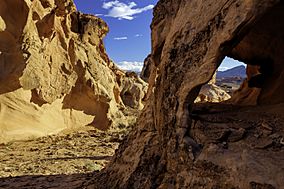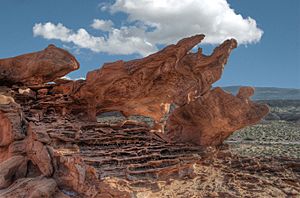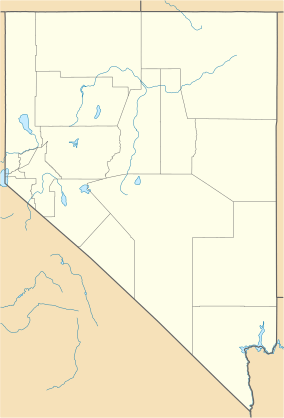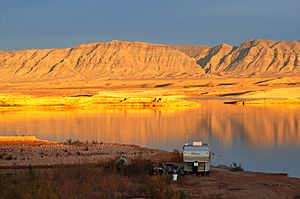Gold Butte National Monument facts for kids
Quick facts for kids Gold Butte National Monument |
|
|---|---|

Rock formations in Gold Butte National Monument
|
|
| Location | Nevada, United States |
| Nearest city | Mesquite, Nevada |
| Area | 296,937 acres (120,166 ha) |
| Established | December 28, 2016 |

Gold Butte National Monument is a special protected area in the Nevada desert. It's located northeast of Las Vegas and covers almost 300,000 acres. This monument protects amazing desert landscapes. You can find ancient rock art, cool sandstone towers, and important homes for animals here.
Some of the animals living here include the Mojave Desert tortoise, which is a threatened species (meaning it's at risk of disappearing). You might also spot bighorn sheep and mountain lions. The monument also protects old ranching and mining spots. There's even a ghost town called Gold Butte, though only a few old foundations and rusty tools remain. The Bureau of Land Management takes care of this special place.
Contents
Protecting Gold Butte's Nature and History
Gold Butte National Monument covers about 297,000 acres. It connects Lake Mead National Recreation Area and Grand Canyon–Parashant National Monument. This creates a large, unbroken area of protected land. It also forms a wildlife corridor, which is like a safe pathway for animals to move between different areas.
Animals and Plants of the Desert
Many important animals live inside the monument. These include the Mojave Desert tortoise, which is a threatened species. You can also find bighorn sheep and mountain lions. Other birds like Gambel's quail and chukar partridges also call this place home.
The monument is also important for its cultural and natural features. You can see amazing rock art carved into the rocks by ancient people. There are also unique sandstone formations shaped by the weather. Within the park, you might find old rock shelters, cooking pits for agave plants, and ancient projectile points (like arrowheads).
Keeping the Monument Safe
Before Gold Butte became a national monument, some parts of it were getting damaged. Reports showed that old fences were taken apart, Joshua trees were cut down, and petroglyphs (rock carvings) were shot at. Protecting this area helps stop such damage.
Fun Activities at Gold Butte
Gold Butte National Monument is open for many fun activities. You can go hiking, hunting, and horseback riding. Camping and picnicking are also popular. You can drive off-road or bike on special roads and trails. People can also gather minerals and other materials important to Native American groups who have lived here for thousands of years.
The monument is now protected from large industrial projects. This means the land will stay wild and open for everyone to enjoy. In 1998, Clark County, Nevada stopped new cattle grazing permits here. The monument allows for existing water rights and roads to be kept up. However, no new claims for these things can be made.
How Gold Butte Became a Monument
President Barack Obama officially made Gold Butte a national monument on December 28, 2016. He used a special law called the Antiquities Act to do this. This happened after a two-year effort by local conservation groups. Lawmakers from Nevada and Clark County, along with the Moapa Band of Paiute Indians, also worked hard for this.
The monument was created on the same day as Bears Ears National Monument. U.S. Representative Dina Titus and Senator Harry Reid were big supporters. The Las Vegas Paiute Tribe also strongly supported the monument's creation.
Some politicians from the Republican Party did not agree with this decision. They, along with former Nevada Attorney General Adam Laxalt, wanted Congress to cancel the monument's designation.
Wilderness Areas Inside Gold Butte
Two special wilderness areas are located within the monument. These are called Lime Canyon and Jumbo Springs. Wilderness areas are places where the land is kept as natural as possible, with very few human changes.
 | May Edward Chinn |
 | Rebecca Cole |
 | Alexa Canady |
 | Dorothy Lavinia Brown |




